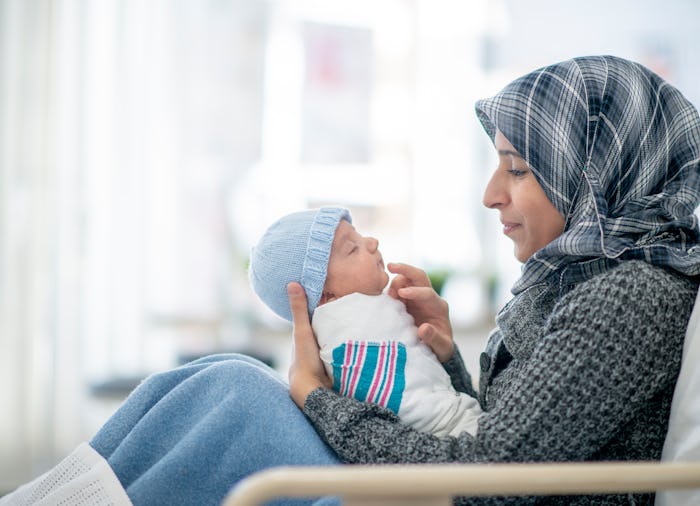Life

If Your Baby Won't Sleep, Here's Why You Should Try Stroking Their Little Nose
Frozen 2 is full of emotionally charged scenes, but none more endearing than a small scene at the beginning where Anna and Elsa's mom rubs Anna’s nose to help her fall asleep. It's adorable and heartwarming, but also stroking your baby’s nose to put them to sleep actually... works? OK, Disney. I'm listening.
Dr. Daniel S. Ganjian, a pediatrician at Providence Saint John’s Health Center tells Romper, “Stroking any part of your child's face calms a child and allows them to fall asleep more quickly. Stroking allows your child to feel safe and loved, filling up their emotional needs. The theory is that the nerves of the face/head go straight into the brain, whereas nerves from the rest of the body do not go straight to the brain. The latter have to pass through the spinal cord first. Since the facial nerves have a direct connection with the brain, they are more potent. That is why kisses to the face provoke the most emotions.” Pretty fascinating stuff, right?
“With some babies, they find it relaxing, so they fall asleep. I don’t think this is scientific, but also, when you stroke their nose, the instinct is to close your eyes, so if they are tired, it can make them fall asleep," Dr. Gina Posner, a board-certified pediatrician at MemorialCare Orange Coast Medical Center tells Romper.
The technique of rubbing your baby’s nose isn't as odd as it sounds — parents will try anything to get their child to sleep. Ganjian has had parents of his patients keep the vacuum cleaner running to get their baby to go to sleep and stay asleep, and Posner says, “One parent used the sound and vibration of a dryer running for their baby to fall asleep.” I mean, at least by stroking your baby's nose, you can just marvel at their perfect little face.
As for other tips and tricks to get your baby to go to sleep that aren’t so strange, Ganjian suggests gently rubbing your child’s closed eyes. “This causes the vagus nerve to send relaxation signals to the body and slow down the heart rate, making the person more relaxed and prepared for sleep.”
Posner says certain techniques are definitely kid-dependent. “Some children get annoyed with you rubbing their hair or their back, but a lot find this very relaxing. Some calming music can help soothe infants and children to sleep. Also, a routine before actual bed can be useful —baths can be very relaxing and calming. Other parents like taking their kid for a ride in a car or a stroller to lull them to sleep.”
But hey, if softly rubbing their sweet little face will send them off to slumberland, that's pretty perfect. For an added bonus, you can tell your kids that’s how their favorite princess falls asleep.
Experts:
Dr. Daniel S. Ganjian, a pediatrician at Providence Saint John’s Health Center in Santa Monica, California.
Dr. Gina Posner, a board certified pediatrician at MemorialCare Orange Coast Medical Center in Fountain Valley, California.